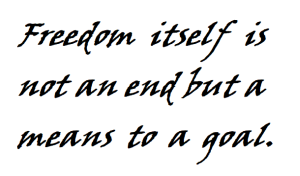A review of Os Guinness: Last Call for Liberty – Part 3
What is freedom? Although it is a simple word that is part of the vocabulary of young children, the concept contains complexities and paradoxes that are not evident at first glance.
In previous posts I have discussed Os Guinness’s recent book Last Call for Liberty. He devotes an entire chapter to the question: do Americans understand what freedom is? Although it is a quintessential American value, we don't realize that we don't necessarily agree on what the word means.
A fairly straightforward definition the author proposes is the capacity to exercise the will without interference or restraint as the genuine expression of who you are. Lord Acton gave an even more succinct definition: the absence of coercion.
But such statements obscure many assumptions and implications of human freedom, which can be seen in some key points that the author brings forward:
- Freedom is a matter of the human will. Any belief in determinism is inconsistent with freedom.
- Freedom entails the idea of commitment. Without the ability to make and keep promises, freedom is impossible.
- Freedom includes the notion of human responsibility. It implies the ability and need to own our choices and actions. “Precisely because we are free, we are responsible whether we like it or not.”
- Freedom involves the opportunity to exercise power. But—contrary to the views of Nietzsche and today’s post-modernists—it is more than simply power. Freedom must be rooted in a vision of truth.
- Freedom requires genuine options from which to choose.
- Freedom is not an end but a means to a goal.
- Freedom has a collective dimension. Legitimate freedom must take into account the impact of choices on others.
Guinness further unpacks point #6 by describing the concepts of negative and positive freedom. While in English the same word is used for both, in the Hebrew they are indicated by two different words: ḥofesh and ḥerut.
 Negative freedom, ḥofesh, can be described as freedom from. It incorporates the idea of absence of coercion mentioned above, the “right to be let alone.” Our basic liberties protected by the Bill of Rights, such as freedom of speech, religion, and the press, are examples of negative freedoms.
Negative freedom, ḥofesh, can be described as freedom from. It incorporates the idea of absence of coercion mentioned above, the “right to be let alone.” Our basic liberties protected by the Bill of Rights, such as freedom of speech, religion, and the press, are examples of negative freedoms.
Negative freedom is what most people assume when they think of “freedom,” and it is indeed absolutely foundational to any true practice of liberty.
But negative freedom is not enough. Guinness says that alone, negative freedom is simply license that will lead to either chaos or tyranny. A full understanding of freedom must also include the Hebrew concept of ḥerut, “freedom for.”
Positive freedom means the power to pursue a vision of truth, of greatness, of human flourishing and the common good. This is why truth is an essential component to freedom.
When the Pilgrims came to the New World, they were not simply escaping from religious coercion. They were looking to establish a society that reflected their ideals, their vision of a righteous and just society.
Their view reflects the understanding of freedom found in Christian theology. When the New Testament author Paul says that “it is for liberty that Christ has made you free” (Galatians 5:1), he is not talking primarily about escape from the rules and regulations of the Jewish law, or even the penalty of sin. He is describing the power to live effectively as a truly good and righteous person.
Unfortunately, the concept of positive freedom, as well as many of the other aspects listed above, are mostly lost in American society. Most people still value the absence of coercion, but they don't understand that liberty must be exercised for a goal that is larger than itself.
In particular, the post-modernist, anti-truth reduction of freedom to simply an exercise of power is especially dangerous. Freedom must be rooted in a recognition of truth in order to result in a flourishing society.






